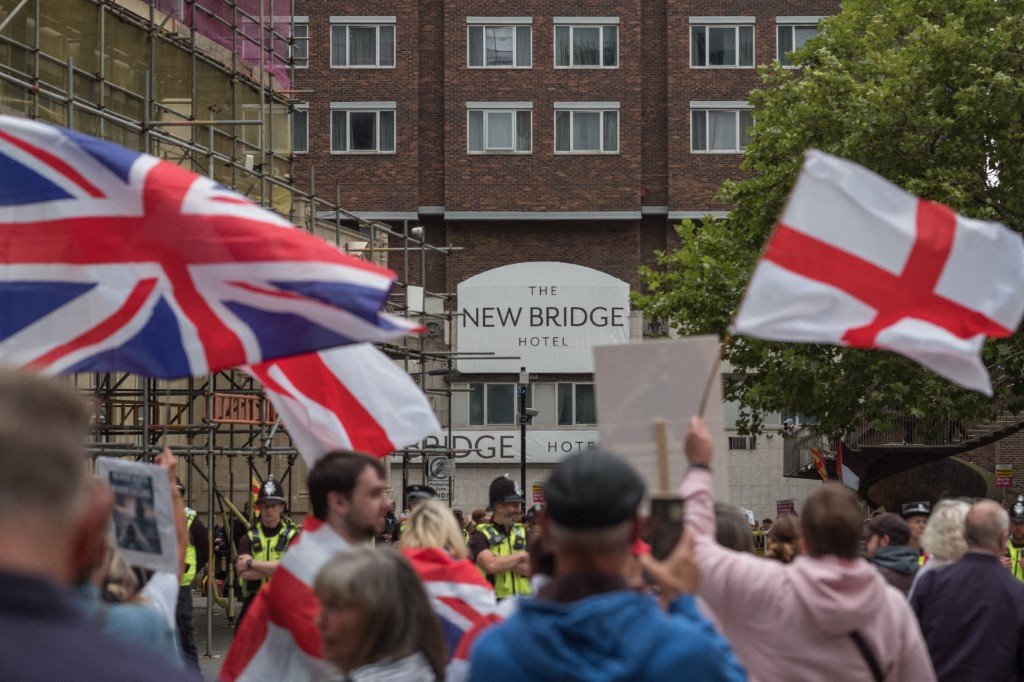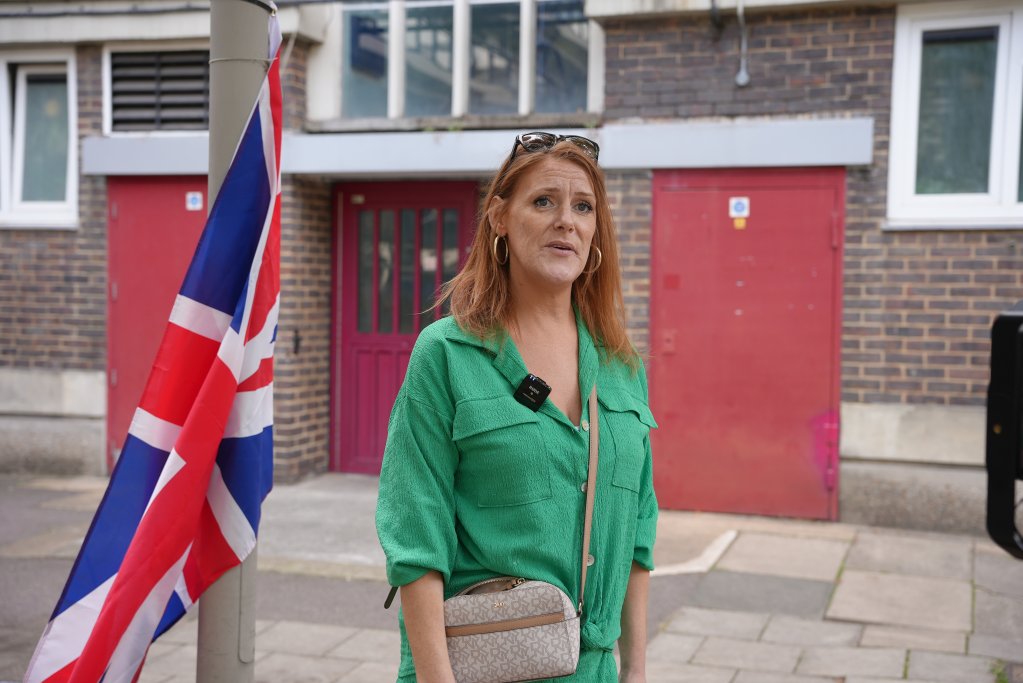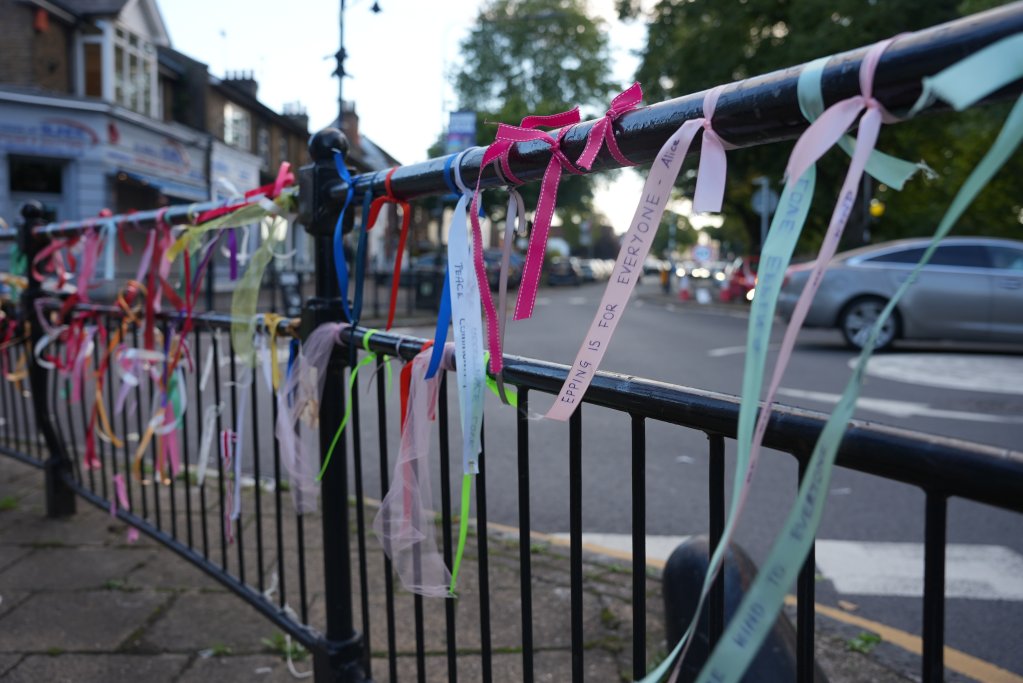Repeated anti-migrant protests have been taking place in Britain since July. They erupted after an Ethiopian asylum seeker was accused of sexual assault in the city of Epping. The movement later spread and intensified over the government’s use of hotels to accommodate asylum seekers.
In the small city of Epping, The Bell Hotel has barricaded itself behind a wire fence. Like all the hotels which house asylum seekers in the UK, the site is monitored by security guards which only let residents enter the premises.
The red and white Saint George’s flag are tagged on the ground and the surrounding panels – visible traces of the protests from a few days ago to demand the closure of the hotel, which houses single male asylum seekers.
The hotel became a flashpoint for anti-migrant protests when an Ethiopian asylum seeker was accused of sexually assaulting a 14-year-old girl. Protests began in Epping shortly after this incident and then spread across the country. The asylum seeker was found guilty of all the charges on September 4. He will be sentenced on September 23.
The protest movement, supported by Nigel Farage's far-right Reform UK party, comes a year after a separate wave of protests that rocked the country last summer. They were triggered after three children were stabbed to death in Southport. Far-right activists falsely claimed the attacker was a migrant who had arrived in the UK illegally. Yet the teenage attacker was in fact born in Wales to Rwandan parents.
‘22 percent of the population lives in poverty’
The focal point of this summer’s protests was the hotels accommodating asylum seekers around the country. After the sexual assault committed in Epping, the Epping Forest District Council sought an injunction from the British Supreme Court to block asylum seekers from being housed there. The court initially granted a temporary injunction to block the use of The Bell Hotel for the housing of asylum seekers. The Court of Appeal later overturned the ruling, stating that the previous court’s ruling could set up a precedent for other cities that would like to follow Epping’s example.

The decision gave a little breathing room to Keir Starmer’s government, which feared a major housing crisis for asylum seekers if several cities were forced to close their hotels. The British Home Secretary Yvette Cooper, replaced by Shabana Mahmood in a September 5 government reshuffle, tried to appease the protesters by promising them that the hotels would be closed by 2029.
The home secretary’s announcement failed to placate the protesters, even though it was followed by other measures restricting the rights of asylum seekers. Sophie Watt, a researcher specializing in migration at the University of Sheffield, attributes the protests to several causes. The first is, "the economic precarity which persists in the United Kingdom after years of austerity: 22 percent of the population lives in poverty and cannot make ends meet," she said.
Read AlsoUK party leaders urged to address 'hatred' fueling anti-migrant protests
Far-right media sources have also played a major role in fueling the anger, according to the researcher. "There is a media construct around the migrant that serves as a diversion for the government. When people are interested in migrants as they are portrayed in these media, they turn away from the causes of the decline in their standard of living."
‘We pay taxes to fund this’
The hotels themselves also fuel the belief of protesters that asylum seekers benefit from free hotel stays paid for by the British, where they enjoy pleasures that the locals will never have.
Tony (who gave only her first name) regularly protests in London's Bethnal Green neighborhood with other women from the neighborhood against the presence of asylum seekers in a nearby hotel. "They're putting 600 undocumented illegal migrants in the middle of a community, and no one is there to guarantee the safety of the children and women in the neighborhood. We pay taxes to fund this," she said, standing next to the British flag she just attached to a pole.

She also directed her anger at the asylum seekers themselves. "These aren't migrants from countries at war, they're not refugees, they're economic migrants. They come from Sweden, Tunisia, Turkey; these aren't countries at war […] We have video evidence that they're drugged, that they're taking methadone," she said.
‘I couldn't stand hearing protesters speak for me’
Some protests in Epping and elsewhere escalated, with property damaged and arrests that followed. Several shop windows were smashed on the main street. Asylum seekers staying in a hotel in West Drayton, west London, even had to be relocated following particularly violent protests on August 30.
Amid the violence, asylum seekers have avoided leaving the hotels as much as possible. This saddens Kerry Gilroy, an Epping resident who co-founded the citizens' collective Epping for Everyone. "We used to see asylum seekers playing football near the forest. I was happy to see that they felt comfortable here," said the mother.
She welcomed InfoMigrants into the living room of her home, along with Alice Marcolin, another member of the collective. The two women said the collective initially brought together women from the town who were outraged that protesters were speaking out for them. "I couldn't stand hearing protesters speak out for me and say that women didn't feel safe in Epping with their slogan 'Protect our girls and women'," said Alice.
‘We wanted to defend another point of view’
In response to the British flags brandished by protesters and hoisted on many city poles in support of the ultra-nationalist movement opposed to the presence of migrants in the United Kingdom, the Epping for Everyone collective attached small colored ribbons to a city sidewalk’s railing.

Kerry and Alice wanted to show that anti-migrant protests don't have the support of the entire British population. The women sought to "defend another point of view: We feel comfortable here and we don't think the hotel is a problem."
For Watt, the protesters represent "a very vocal minority which have access to very powerful media platforms. Their voices are amplified within society."
In response, Epping for Everyone wished to "bring something different from the headlines about anti-migrant protests." The movement is gaining traction. "We've been contacted by residents of other towns who wanted to create a non-political community group like ours."
Read AlsoExplainer: How the UK houses asylum seekers and why it is so contentious
